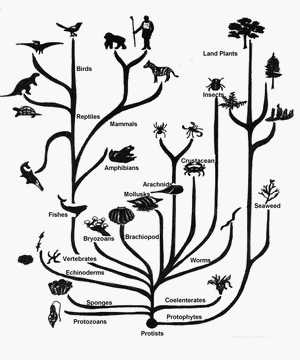 |
Who
Cares?
The
Philosophical Implications of Evolution
|
Our government and our public education system today operate on the
twin premises that the theory of evolution has been proven, and that
God, if he exists, is both irrelevant and illegal in the public
square. Evolution itself is built upon the following
premises:
Matter is supreme, for it is eternal; random mistakes (mutations) are
good, for they manufacture change; random change is beneficial, for it
inevitably fosters improvement through the mechanism of survival of the
fittest over time; and time is essential – because evolution requires
eons of time to bring about the conditions we observe today.
People who promote this paradigm demand, however, that I make enormous
leaps of faith. They expect me to believe that at least one
explosion, The Big Bang, was creative, not destructive; that life has
accidentally sprung from non-life; that intelligence has accidentally
evolved from non-intelligence; that random chance has mutated into
purposefulness and design; and that inert matter has magically produced
conscience and a sense of right and wrong. I’m sorry, but I
don’t
have that much faith, and faith sounds too much like religion to me,
which is supposed to be off-limits.
So let’s cut out the faith stuff and consider the logical implications
of evolution. Friedrich Nietzsche, nineteenth century German
philosopher, spoke eloquently when he said that if evolution is true,
the noblest human emotion is hate, in keeping with survival of the
fittest. I agree with Nietzsche. If evolution is
true, then
the most important thing I can do is survive. So I am
justified
in eliminating any obstacles to my survival, whether they be plants,
animals, or other humans. If survival of the fittest is the
engine of progress, then why build hospitals or educate
doctors?
Who cares? Let the unfit sick with their poorly developed
immune
systems die! They are merely a drag on upward mobility.
And don’t preach to me about recycling, about preserving our earth,
keeping it suitable for us humans. That sounds too much like
narcissistic morality. Who do we think we are to prevent
inexorable progress? Let the next specie, superior to our
own,
evolve! I’m sure some life form will evolve which thrives on
eating unrecycled aluminum cans and plastic bags, and is impervious to
lead paint and carbon monoxide.
And don’t preach to me about tolerance, either. How do you
get
tolerance out of carbon, hydrogen, oxygen, and nitrogen?
There is
no right or wrong, only survival, so the ultimate good is
power.
I want to maximize my power so I survive and my enemies don’t.
If you find the logical implications of evolution distasteful, I agree
with you. I do too. So let’s start with a premise
that
actually makes sense. Like, there is a God who has revealed
Himself in the Bible. Out of that premise flows the
following:
God created everything that exists. We are responsible to
Him. When we break His laws, we die. God loves
us. He
sent His Son to die and rise again to pay for our sins. If we
trust in Jesus we can be forgiven and have eternal life. Then
we
can meaningfully serve God and the people He loves. |

